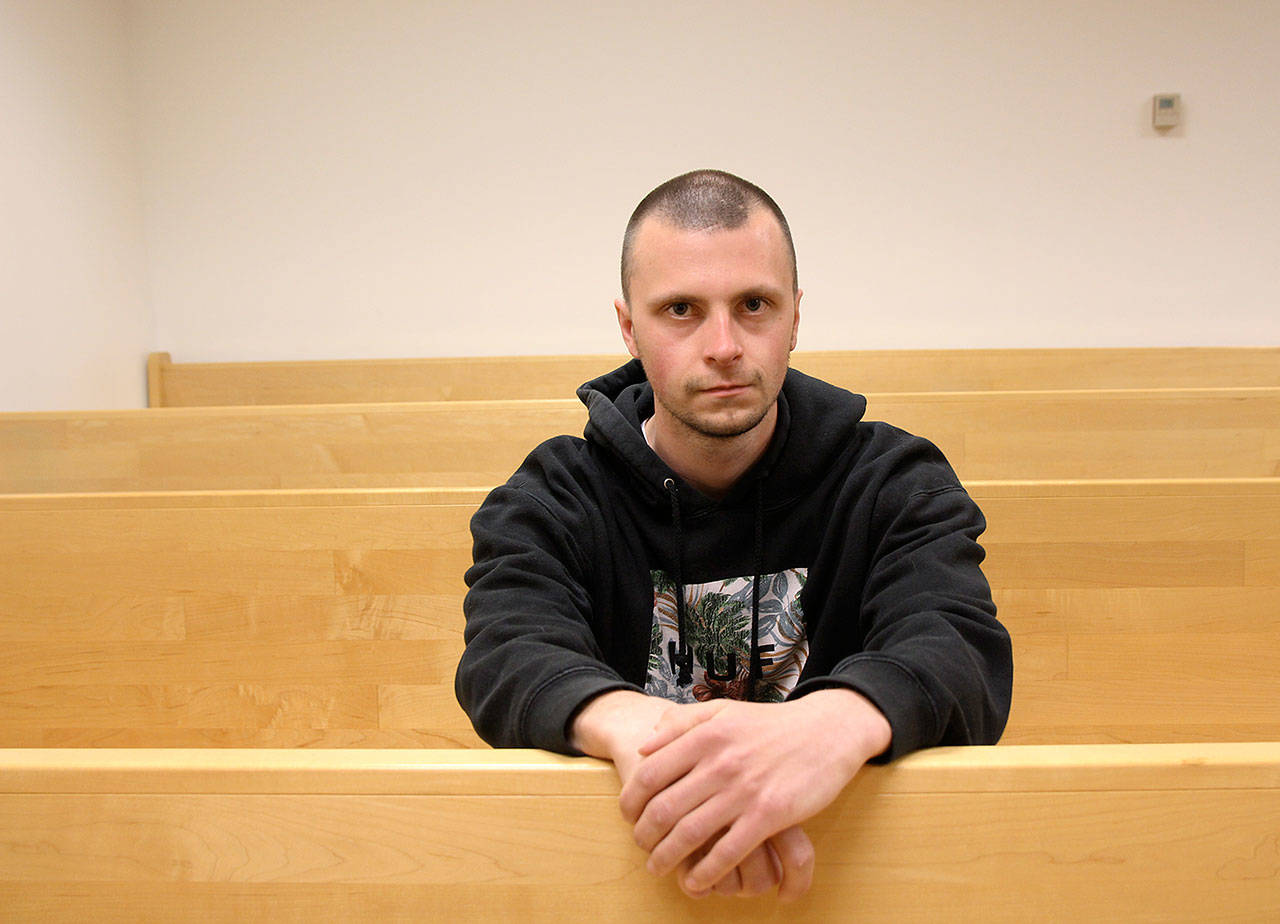Kody Schwiger gave up everything for heroin.
A low-point, he recalls, was a night in which he smoked the drug in a dark port-a-potty and started walking to his parents’ Clinton home. He had been kicked out, but sometimes broke into a camper trailer on the property and slept there.
It started raining hard as he walked, instantly soaking him to the bone. He made it to the trailer and smoked some more, even before taking off his wet clothes. After a night of shivering in the cold, he put the wet clothes back on in the morning and went off to find more of the drug.
Schwiger financed his habit by breaking into vacation homes and often spent nights in those homes, eating what food he could find.
He had no future. Heroin, he said, kept him in a delusional fog.
Schwiger was eventually arrested for breaking into a house and was facing a felony charge. He was accepted into Island County Superior Court’s adult Drug Court, a program in which participants are closely monitored and have to complete a treatment program and other requirements. If successful, the charge is erased from the participant’s record.
Schwiger didn’t do well, though not for lack of trying. He just couldn’t kick the habit. He was in danger of being expelled, so he finally agreed to try Suboxone, a medication that helps people get off heroin.
For Schwiger, it made all the difference. He was finally able to stop using and turn his life around. He graduated from adult Drug Court last Thursday in a ceremony attended by drug-court participants, judges, attorneys and court employees who worked with him every step of the way. They each cited Schwiger’s hard work and the medication as crucial to his success.
“You have grabbed back the opportunities that were once in front of you,” Judge Vickie Churchill told Schwiger, noting that he hopes to go to college and someday become a lawyer.
Those who run the drug court in Island County hope that Schwiger will be just the first of many graduates to be helped by “medication-assisted treatment.”
Andrea Hastreiter, drug court coordinator, said drug-court officials have been astonished about how well Suboxone had worked for those who suffer from opioid addiction. About half of the participants used opioids, either alone or in combination with other drugs or alcohol.
“It is like a miracle if they are ready to commit to behavioral changes,” she said.
“It’s been like clockwork. A complete turnaround.”
Opioid addiction, whether it’s from heroin or pills, is especially pernicious and enduring. Studies have shown that opioids can actually change the structure of the brain, Court Administrator Andrew Somers explained.
Withdrawal is especially difficult for opioid abusers. Somers said many times addicts aren’t using to get high, but just to ward off withdrawal symptoms. That can include severe bone pain, chills, sweating, nausea, vomiting, anxiety, cramps and diarrhea.
“It becomes just survival for them,” he said.
These factors make opioid addiction especially difficult to treat.
Hastreiter went to a national drug court training event a couple of years ago and started hearing about medication-assisted treatment. She introduced the idea to Island County drug court.
Suboxone is different from methadone, an older and controversial treatment for heroin addiction. Suboxone contains a partial opioid agonist, buprenorphine, and naloxone, which blocks the effect of opioids.
People who take the medication don’t get high from it, Hastreiter explained, but it helps prevents withdrawal symptoms and relapse. It also prevents people on the medication from getting high if they do use heroin.
Studies have shown that treatment and counseling for opioid addiction is significantly more effective if coupled with medication, according to the National Drug Court Institute.
Drug court officials, however, ran into roadblocks.
The federal government requires a doctor to receive a special waiver from the Drug Enforcement Agency to prescribe Suboxone. It’s a requirement that makes little sense, officials say. While the law requires doctors to get the special waiver to prescribe a drug that is effective in fighting opioid abuse and is relatively unlikely to be abused, they are free to prescribe highly addictive opioid drugs, such as Vicodin. Many law enforcement agencies point to these drugs as the cause of the national explosion in opioid abuse in recent years.
No physicians on Whidbey Island are able to prescribe Suboxone, though drug court officials have asked some to consider obtaining the waiver. That means drug court participants have to travel off the island to see a doctor.
The Superior Court has a drug court program for both adults and juveniles, though the medication-assisted treatment is only used in the adult court. Younger people have been using for a shorter amount of time and are less likely to need the medical help, they say.
Law-and-justice officials in Island County have strongly supported the drug courts. Judges, court administration, public defense, the prosecutor’s office and the sheriff’s office are all directly involved.
The programs have changed — perhaps even saved — people’s lives, but they also save tax dollars in the long run. Judge Alan Hancock points to a Washington State Institute of Public Policy report that quantifies how much money drug courts save the community by diverting users from the regular law-and-justice system. It amounts to nearly $10,000 for each adult drug-court participant.
While Suboxone doesn’t work for everyone, drug-court officials have high hopes. They predict many more graduations for people who got a little help from medication.



